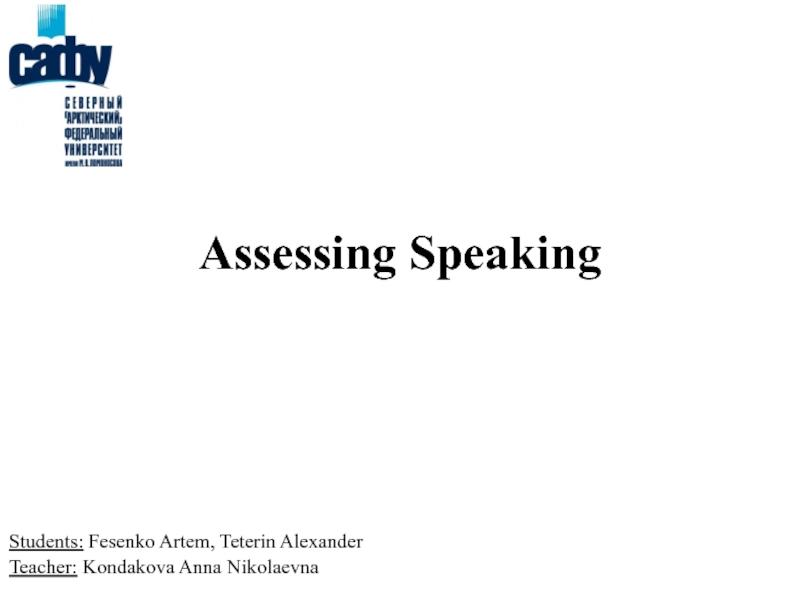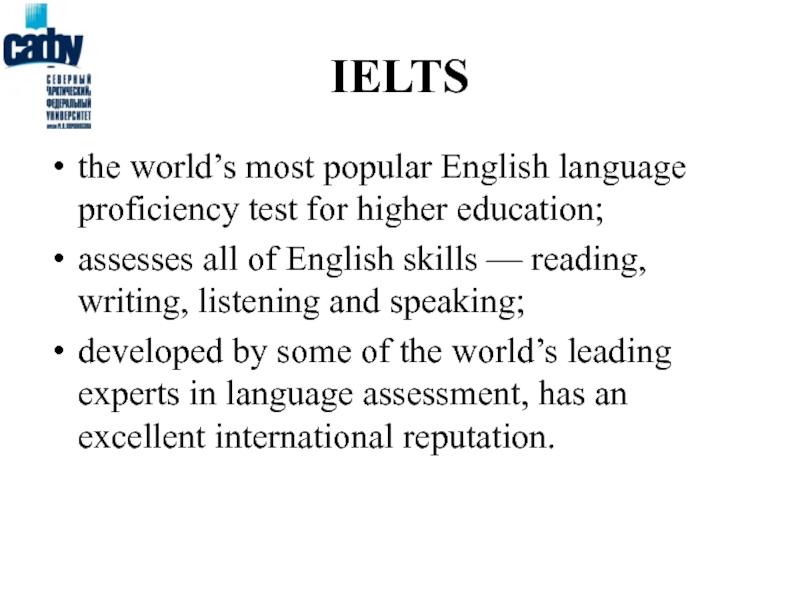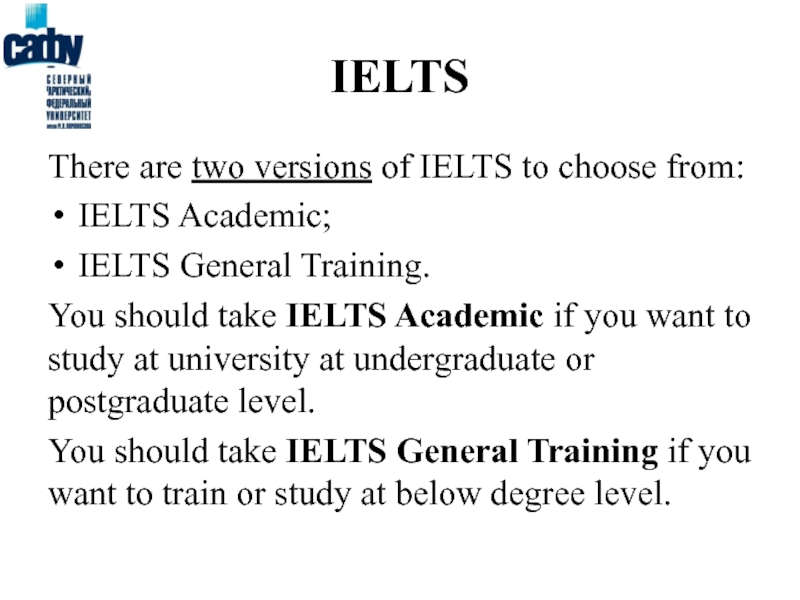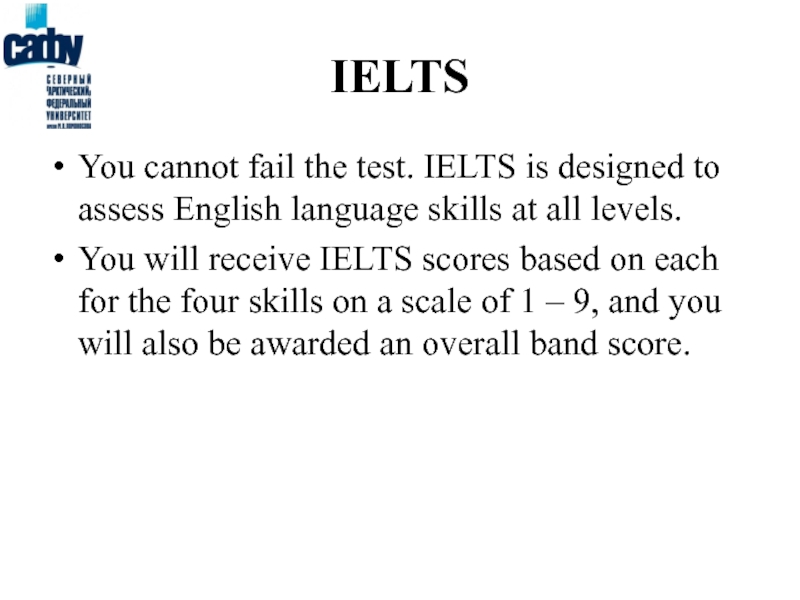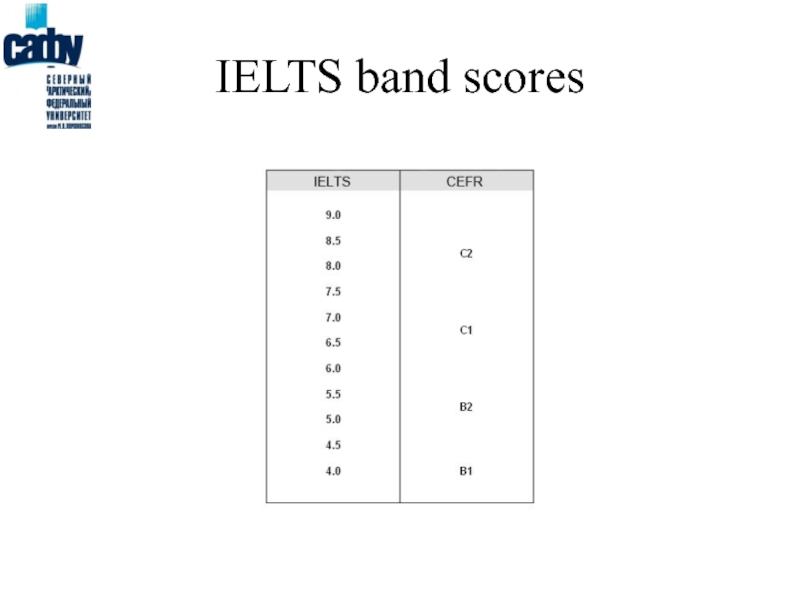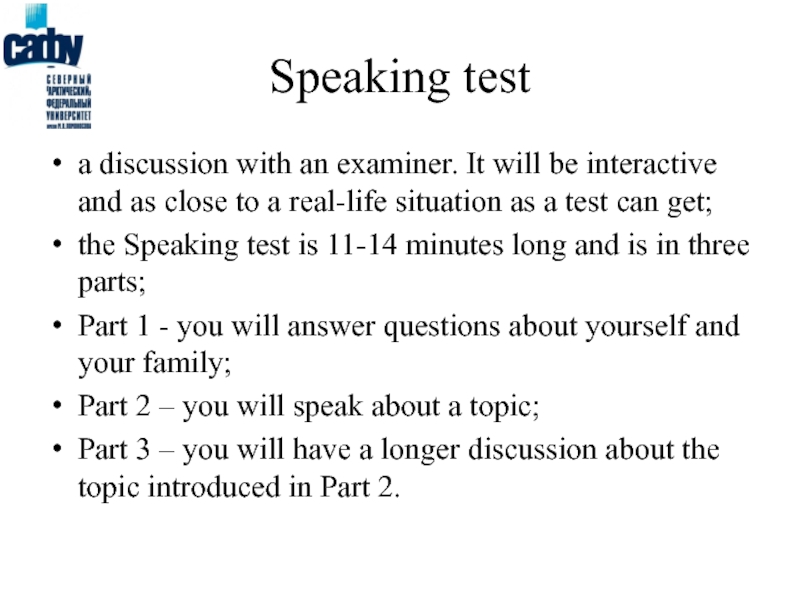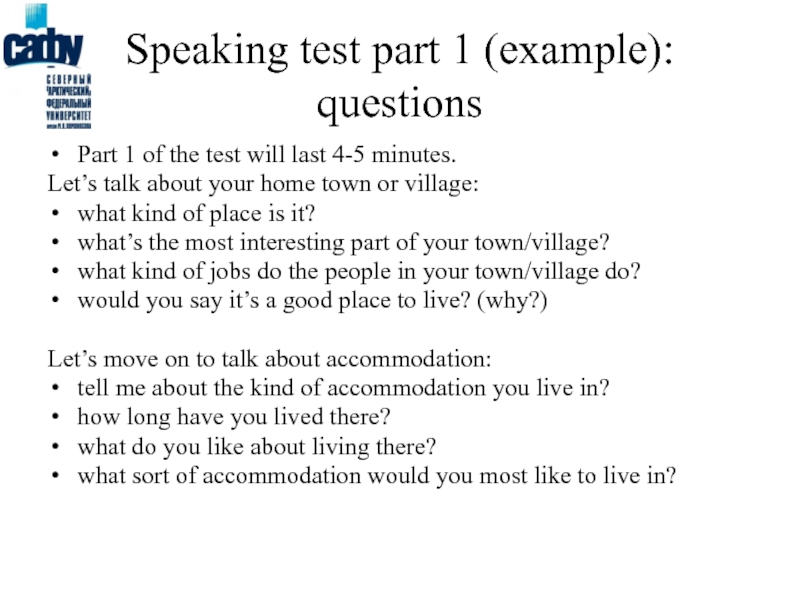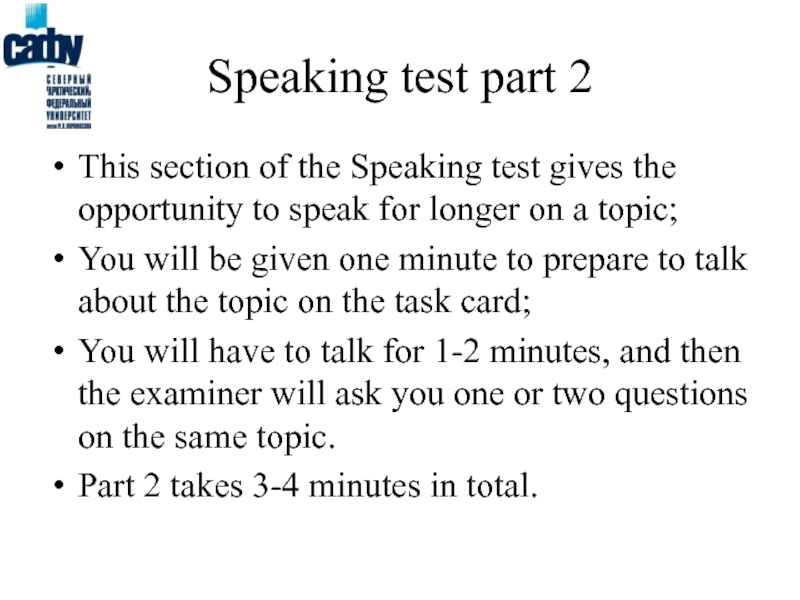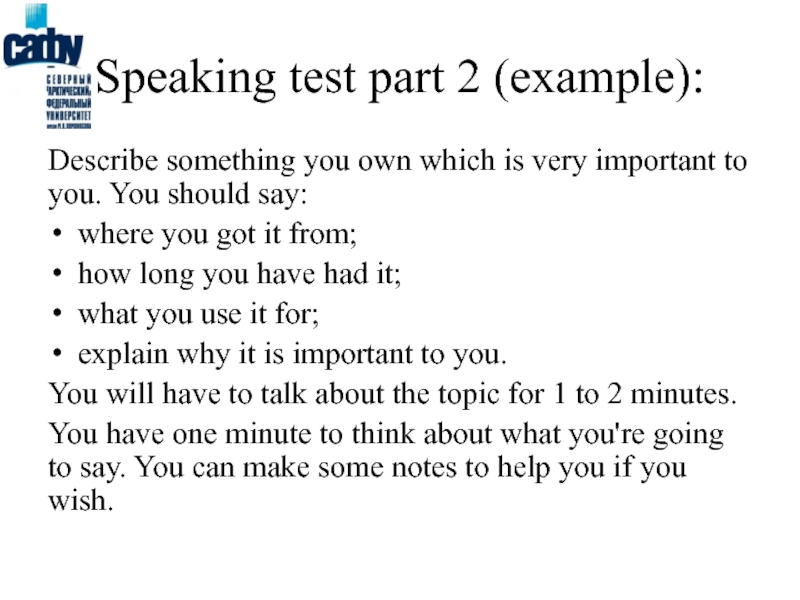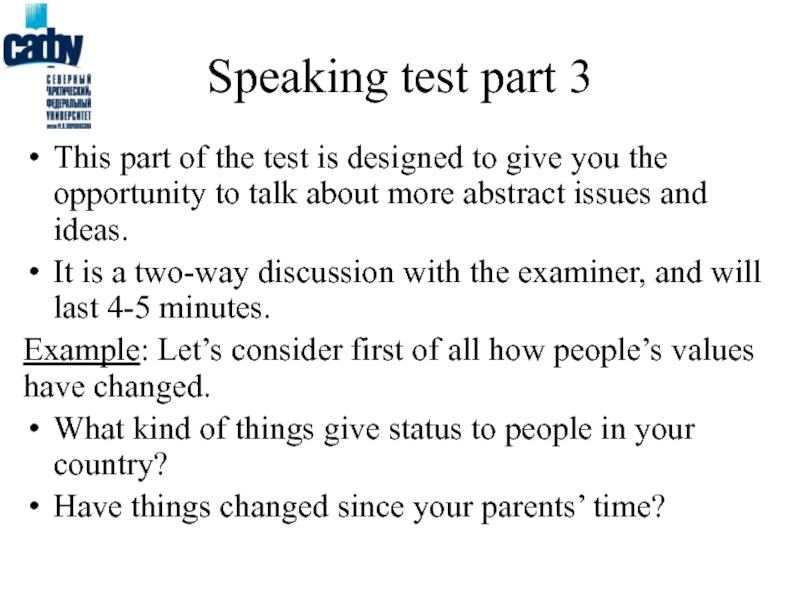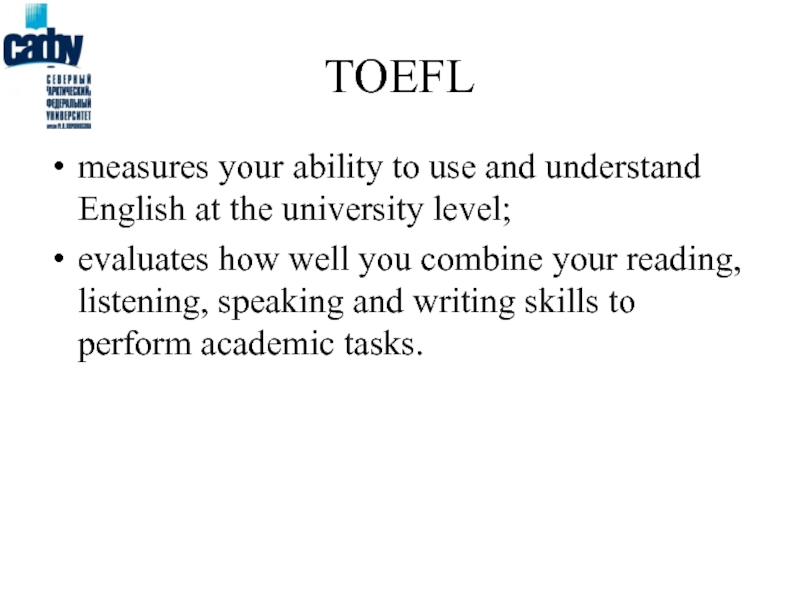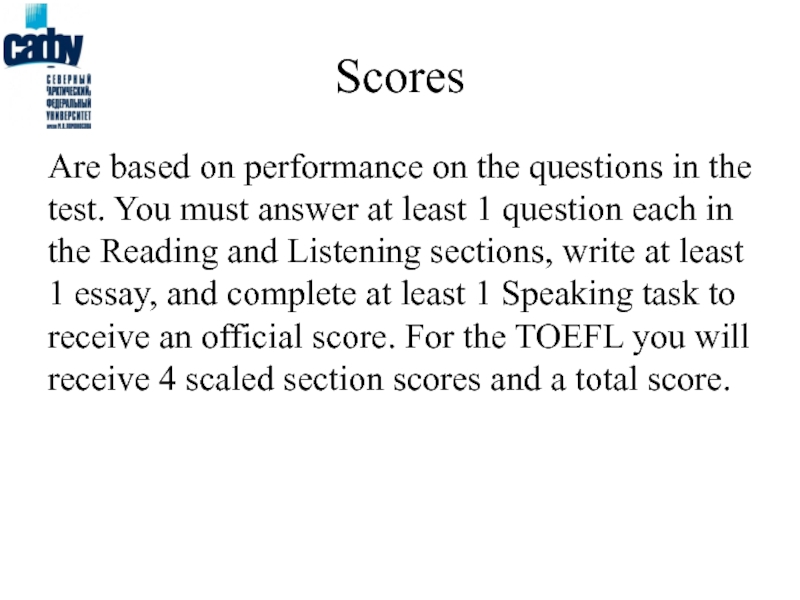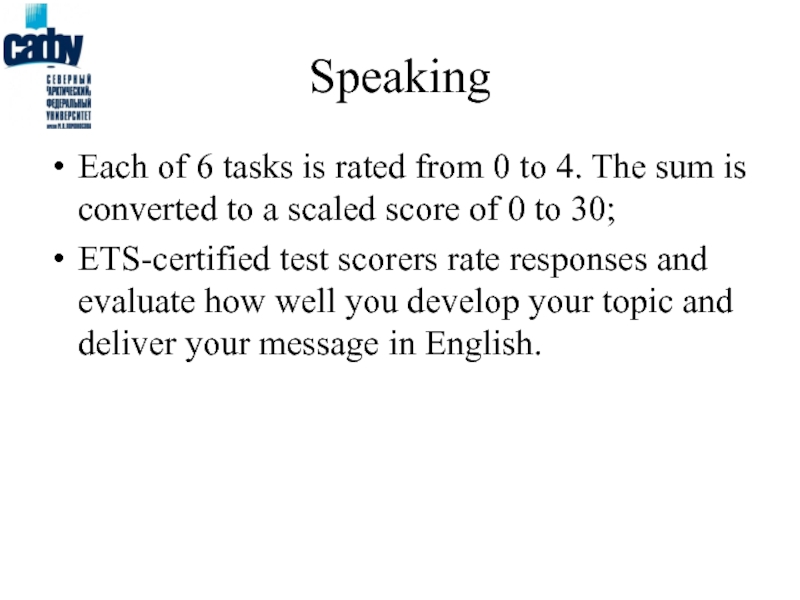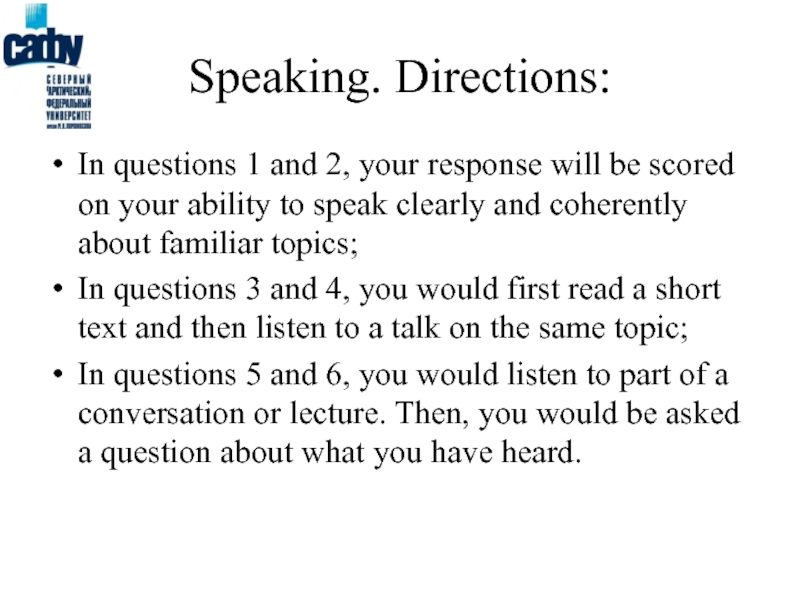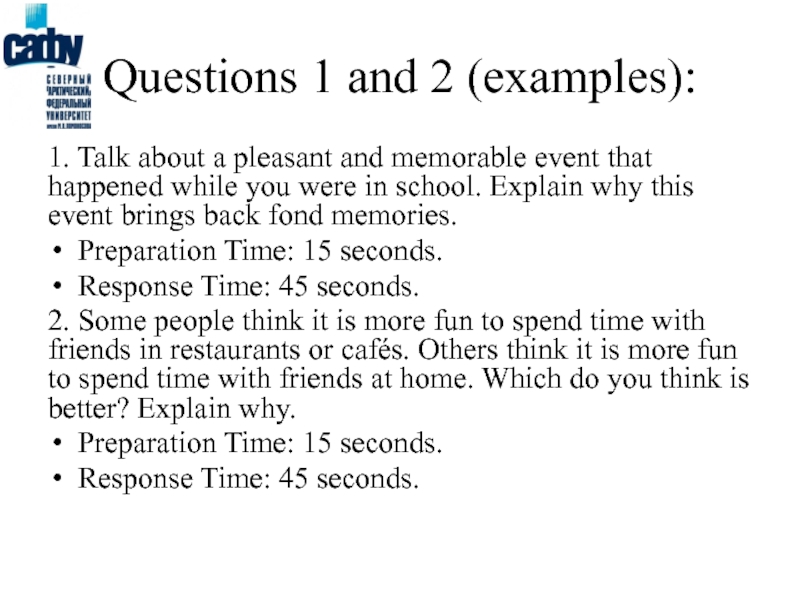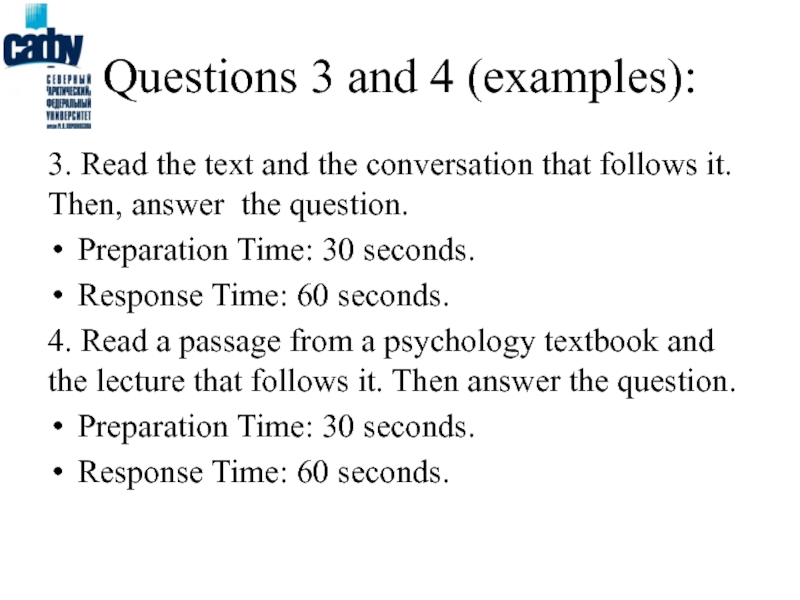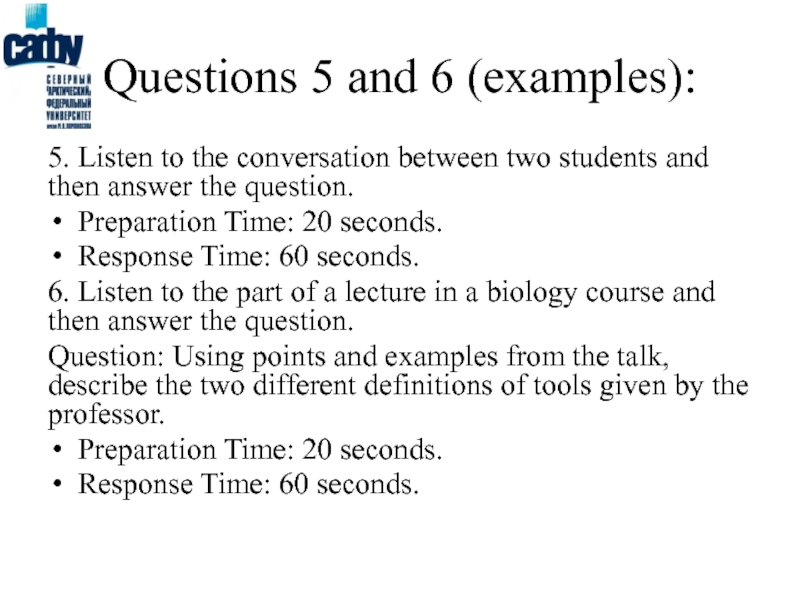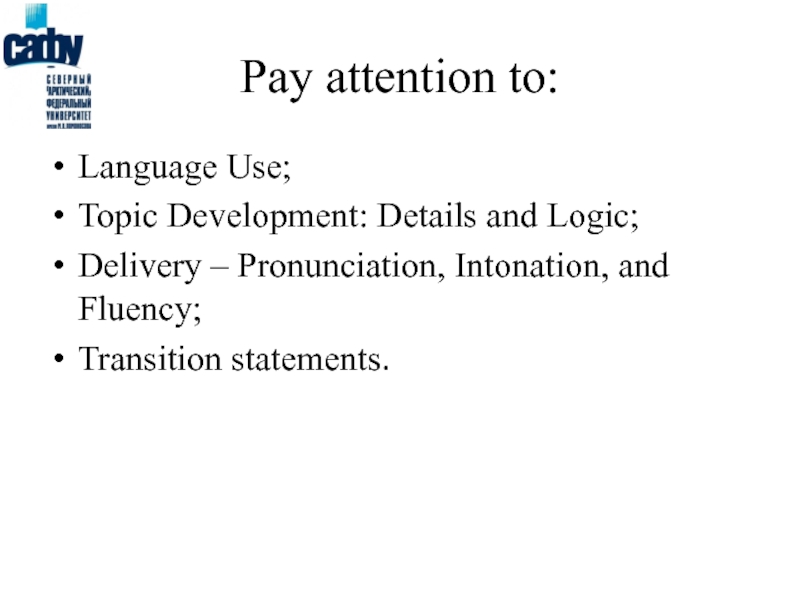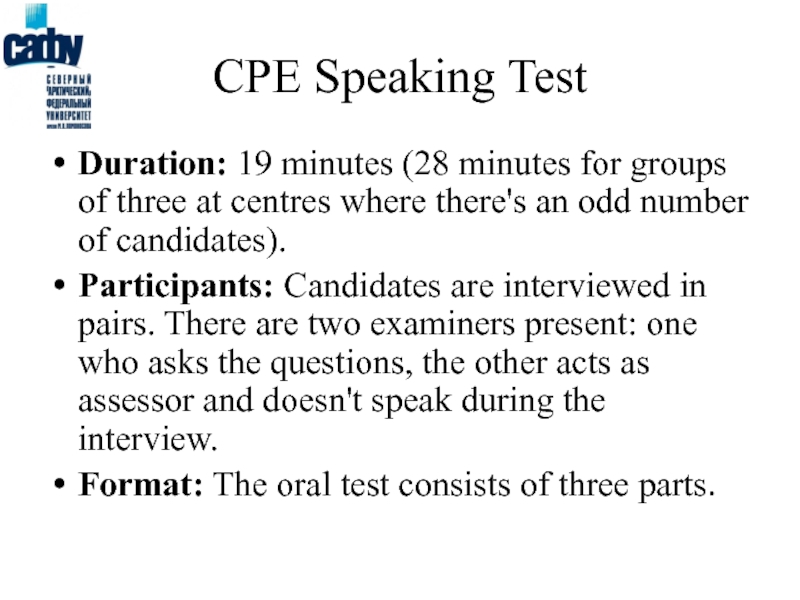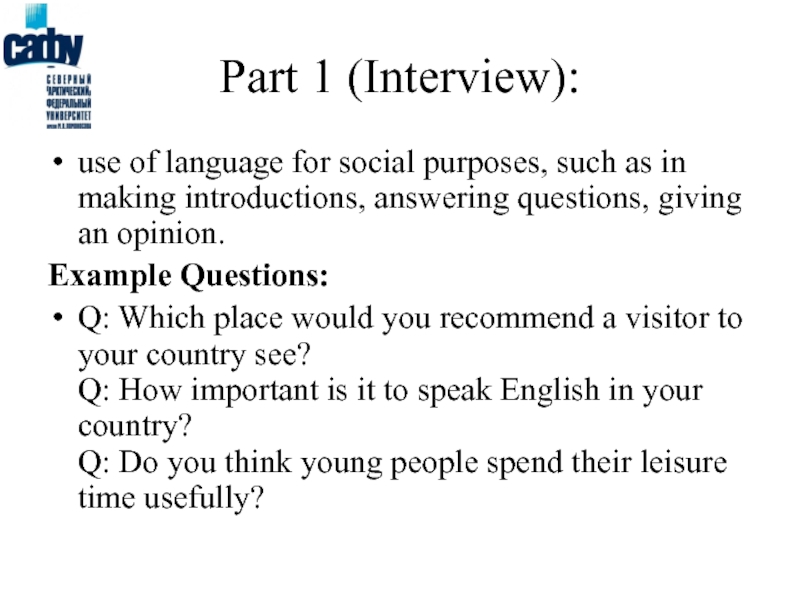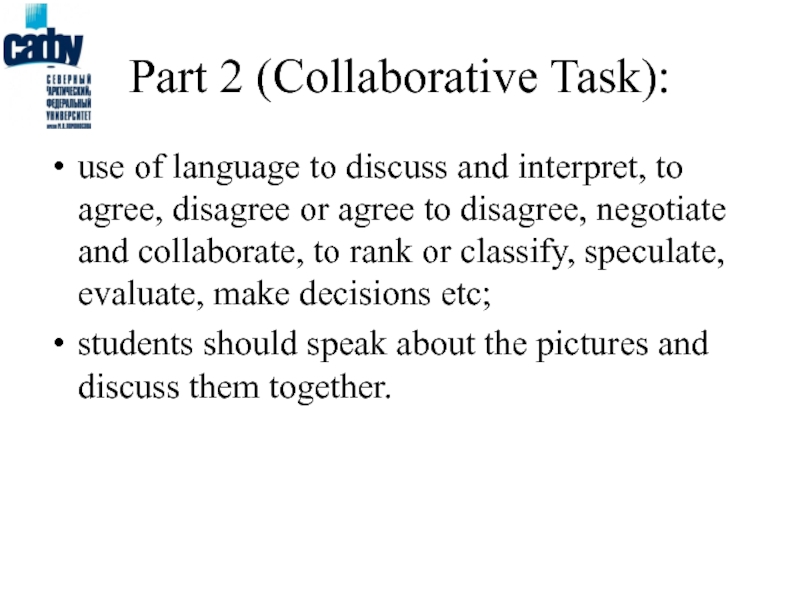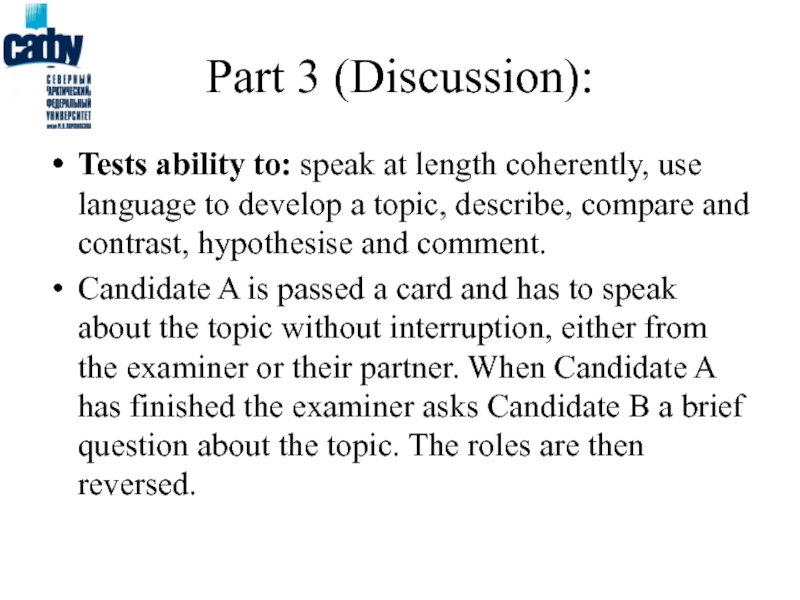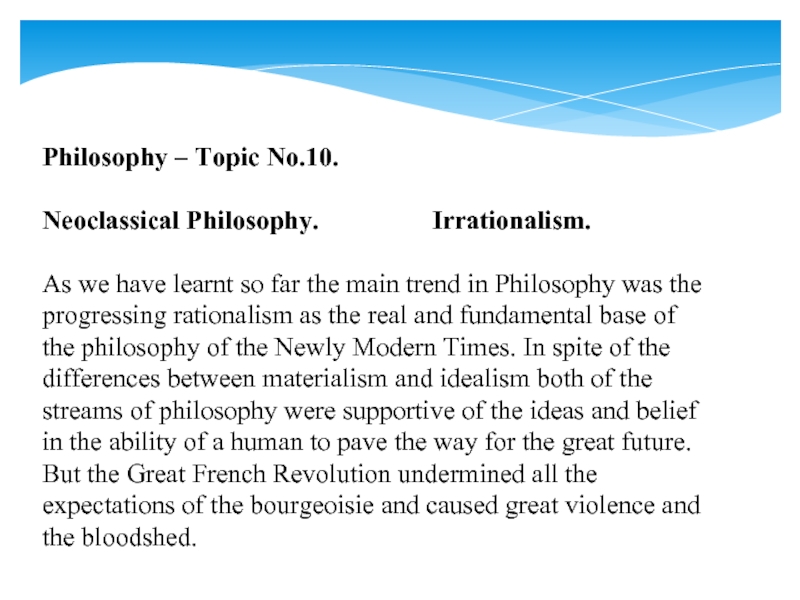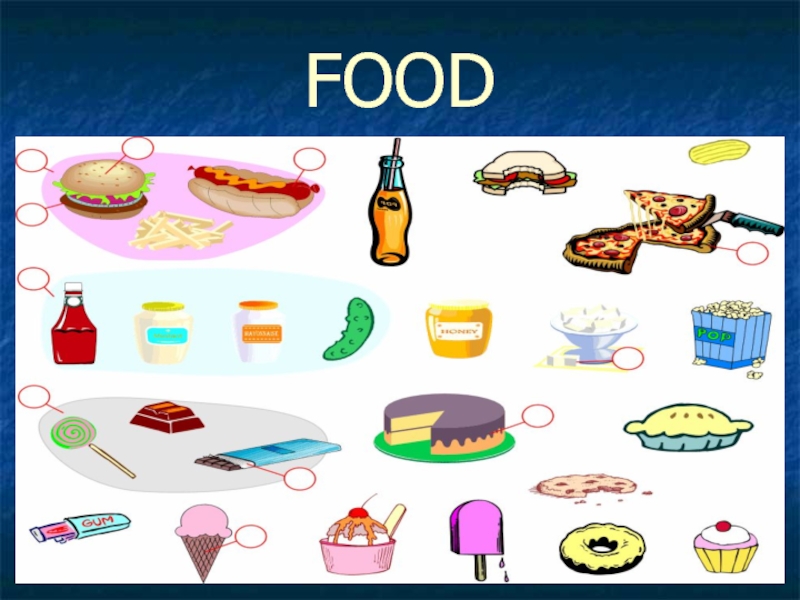- Главная
- Разное
- Дизайн
- Бизнес и предпринимательство
- Аналитика
- Образование
- Развлечения
- Красота и здоровье
- Финансы
- Государство
- Путешествия
- Спорт
- Недвижимость
- Армия
- Графика
- Культурология
- Еда и кулинария
- Лингвистика
- Английский язык
- Астрономия
- Алгебра
- Биология
- География
- Детские презентации
- Информатика
- История
- Литература
- Маркетинг
- Математика
- Медицина
- Менеджмент
- Музыка
- МХК
- Немецкий язык
- ОБЖ
- Обществознание
- Окружающий мир
- Педагогика
- Русский язык
- Технология
- Физика
- Философия
- Химия
- Шаблоны, картинки для презентаций
- Экология
- Экономика
- Юриспруденция
Assessing Speaking презентация
Содержание
- 1. Assessing Speaking
- 2. IELTS the world’s most popular English language
- 3. IELTS There are two versions of IELTS
- 4. IELTS You cannot fail the test. IELTS
- 5. IELTS band scores
- 6. Speaking test a discussion with an examiner.
- 7. Speaking test part 1 (example): questions Part
- 8. Speaking test part 2 This section of
- 9. Speaking test part 2 (example): Describe something
- 10. Speaking test part 3 This part of
- 11. TOEFL measures your ability to use and
- 12. Scores Are based on performance on the
- 13. Speaking Each of 6 tasks is rated
- 14. Speaking. Directions: In questions 1 and 2,
- 15. Questions 1 and 2 (examples): 1. Talk
- 16. Questions 3 and 4 (examples): 3. Read
- 17. Questions 5 and 6 (examples): 5. Listen
- 18. Pay attention to: Language Use; Topic Development:
- 19. CPE Speaking Test Duration: 19 minutes (28 minutes
- 20. Part 1 (Interview): use of language for
- 21. Part 2 (Collaborative Task): use of language
- 22. Part 3 (Discussion): Tests ability to: speak at
- 23. Thank you for your attention!
Слайд 1Assessing Speaking
Students: Fesenko Artem, Teterin Alexander
Teacher: Kondakova Anna Nikolaevna
Слайд 2IELTS
the world’s most popular English language proficiency test for higher education;
assesses
all of English skills — reading, writing, listening and speaking;
developed by some of the world’s leading experts in language assessment, has an excellent international reputation.
developed by some of the world’s leading experts in language assessment, has an excellent international reputation.
Слайд 3IELTS
There are two versions of IELTS to choose from:
IELTS Academic;
IELTS General Training.
You
should take IELTS Academic if you want to study at university at undergraduate or postgraduate level.
You should take IELTS General Training if you want to train or study at below degree level.
You should take IELTS General Training if you want to train or study at below degree level.
Слайд 4IELTS
You cannot fail the test. IELTS is designed to assess English
language skills at all levels.
You will receive IELTS scores based on each for the four skills on a scale of 1 – 9, and you will also be awarded an overall band score.
You will receive IELTS scores based on each for the four skills on a scale of 1 – 9, and you will also be awarded an overall band score.
Слайд 6Speaking test
a discussion with an examiner. It will be interactive and
as close to a real-life situation as a test can get;
the Speaking test is 11-14 minutes long and is in three parts;
Part 1 - you will answer questions about yourself and your family;
Part 2 – you will speak about a topic;
Part 3 – you will have a longer discussion about the topic introduced in Part 2.
the Speaking test is 11-14 minutes long and is in three parts;
Part 1 - you will answer questions about yourself and your family;
Part 2 – you will speak about a topic;
Part 3 – you will have a longer discussion about the topic introduced in Part 2.
Слайд 7Speaking test part 1 (example): questions
Part 1 of the test will
last 4-5 minutes.
Let’s talk about your home town or village:
what kind of place is it?
what’s the most interesting part of your town/village?
what kind of jobs do the people in your town/village do?
would you say it’s a good place to live? (why?)
Let’s move on to talk about accommodation:
tell me about the kind of accommodation you live in?
how long have you lived there?
what do you like about living there?
what sort of accommodation would you most like to live in?
Let’s talk about your home town or village:
what kind of place is it?
what’s the most interesting part of your town/village?
what kind of jobs do the people in your town/village do?
would you say it’s a good place to live? (why?)
Let’s move on to talk about accommodation:
tell me about the kind of accommodation you live in?
how long have you lived there?
what do you like about living there?
what sort of accommodation would you most like to live in?
Слайд 8Speaking test part 2
This section of the Speaking test gives the
opportunity to speak for longer on a topic;
You will be given one minute to prepare to talk about the topic on the task card;
You will have to talk for 1-2 minutes, and then the examiner will ask you one or two questions on the same topic.
Part 2 takes 3-4 minutes in total.
You will be given one minute to prepare to talk about the topic on the task card;
You will have to talk for 1-2 minutes, and then the examiner will ask you one or two questions on the same topic.
Part 2 takes 3-4 minutes in total.
Слайд 9Speaking test part 2 (example):
Describe something you own which is very
important to you. You should say:
where you got it from;
how long you have had it;
what you use it for;
explain why it is important to you.
You will have to talk about the topic for 1 to 2 minutes.
You have one minute to think about what you're going to say. You can make some notes to help you if you wish.
where you got it from;
how long you have had it;
what you use it for;
explain why it is important to you.
You will have to talk about the topic for 1 to 2 minutes.
You have one minute to think about what you're going to say. You can make some notes to help you if you wish.
Слайд 10Speaking test part 3
This part of the test is designed to
give you the opportunity to talk about more abstract issues and ideas.
It is a two-way discussion with the examiner, and will last 4-5 minutes.
Example: Let’s consider first of all how people’s values have changed.
What kind of things give status to people in your country?
Have things changed since your parents’ time?
It is a two-way discussion with the examiner, and will last 4-5 minutes.
Example: Let’s consider first of all how people’s values have changed.
What kind of things give status to people in your country?
Have things changed since your parents’ time?
Слайд 11TOEFL
measures your ability to use and understand English at the university
level;
evaluates how well you combine your reading, listening, speaking and writing skills to perform academic tasks.
evaluates how well you combine your reading, listening, speaking and writing skills to perform academic tasks.
Слайд 12Scores
Are based on performance on the questions in the test. You
must answer at least 1 question each in the Reading and Listening sections, write at least 1 essay, and complete at least 1 Speaking task to receive an official score. For the TOEFL you will receive 4 scaled section scores and a total score.
Слайд 13Speaking
Each of 6 tasks is rated from 0 to 4. The
sum is converted to a scaled score of 0 to 30;
ETS-certified test scorers rate responses and evaluate how well you develop your topic and deliver your message in English.
ETS-certified test scorers rate responses and evaluate how well you develop your topic and deliver your message in English.
Слайд 14Speaking. Directions:
In questions 1 and 2, your response will be scored
on your ability to speak clearly and coherently about familiar topics;
In questions 3 and 4, you would first read a short text and then listen to a talk on the same topic;
In questions 5 and 6, you would listen to part of a conversation or lecture. Then, you would be asked a question about what you have heard.
In questions 3 and 4, you would first read a short text and then listen to a talk on the same topic;
In questions 5 and 6, you would listen to part of a conversation or lecture. Then, you would be asked a question about what you have heard.
Слайд 15Questions 1 and 2 (examples):
1. Talk about a pleasant and memorable
event that happened while you were in school. Explain why this event brings back fond memories.
Preparation Time: 15 seconds.
Response Time: 45 seconds.
2. Some people think it is more fun to spend time with friends in restaurants or cafés. Others think it is more fun to spend time with friends at home. Which do you think is better? Explain why.
Preparation Time: 15 seconds.
Response Time: 45 seconds.
Preparation Time: 15 seconds.
Response Time: 45 seconds.
2. Some people think it is more fun to spend time with friends in restaurants or cafés. Others think it is more fun to spend time with friends at home. Which do you think is better? Explain why.
Preparation Time: 15 seconds.
Response Time: 45 seconds.
Слайд 16Questions 3 and 4 (examples):
3. Read the text and the conversation
that follows it. Then, answer the question.
Preparation Time: 30 seconds.
Response Time: 60 seconds.
4. Read a passage from a psychology textbook and the lecture that follows it. Then answer the question.
Preparation Time: 30 seconds.
Response Time: 60 seconds.
Preparation Time: 30 seconds.
Response Time: 60 seconds.
4. Read a passage from a psychology textbook and the lecture that follows it. Then answer the question.
Preparation Time: 30 seconds.
Response Time: 60 seconds.
Слайд 17Questions 5 and 6 (examples):
5. Listen to the conversation between two
students and then answer the question.
Preparation Time: 20 seconds.
Response Time: 60 seconds.
6. Listen to the part of a lecture in a biology course and then answer the question.
Question: Using points and examples from the talk, describe the two different definitions of tools given by the professor.
Preparation Time: 20 seconds.
Response Time: 60 seconds.
Preparation Time: 20 seconds.
Response Time: 60 seconds.
6. Listen to the part of a lecture in a biology course and then answer the question.
Question: Using points and examples from the talk, describe the two different definitions of tools given by the professor.
Preparation Time: 20 seconds.
Response Time: 60 seconds.
Слайд 18Pay attention to:
Language Use;
Topic Development: Details and Logic;
Delivery – Pronunciation,
Intonation, and Fluency;
Transition statements.
Transition statements.
Слайд 19CPE Speaking Test
Duration: 19 minutes (28 minutes for groups of three at
centres where there's an odd number of candidates).
Participants: Candidates are interviewed in pairs. There are two examiners present: one who asks the questions, the other acts as assessor and doesn't speak during the interview.
Format: The oral test consists of three parts.
Participants: Candidates are interviewed in pairs. There are two examiners present: one who asks the questions, the other acts as assessor and doesn't speak during the interview.
Format: The oral test consists of three parts.
Слайд 20Part 1 (Interview):
use of language for social purposes, such as in
making introductions, answering questions, giving an opinion.
Example Questions:
Q: Which place would you recommend a visitor to your country see? Q: How important is it to speak English in your country? Q: Do you think young people spend their leisure time usefully?
Example Questions:
Q: Which place would you recommend a visitor to your country see? Q: How important is it to speak English in your country? Q: Do you think young people spend their leisure time usefully?
Слайд 21Part 2 (Collaborative Task):
use of language to discuss and interpret, to
agree, disagree or agree to disagree, negotiate and collaborate, to rank or classify, speculate, evaluate, make decisions etc;
students should speak about the pictures and discuss them together.
students should speak about the pictures and discuss them together.
Слайд 22Part 3 (Discussion):
Tests ability to: speak at length coherently, use language to
develop a topic, describe, compare and contrast, hypothesise and comment.
Candidate A is passed a card and has to speak about the topic without interruption, either from the examiner or their partner. When Candidate A has finished the examiner asks Candidate B a brief question about the topic. The roles are then reversed.
Candidate A is passed a card and has to speak about the topic without interruption, either from the examiner or their partner. When Candidate A has finished the examiner asks Candidate B a brief question about the topic. The roles are then reversed.
